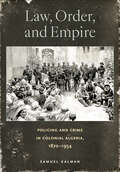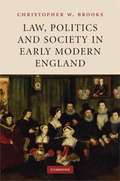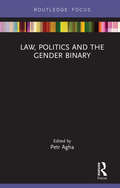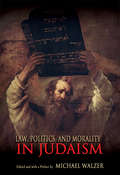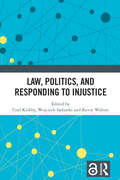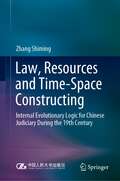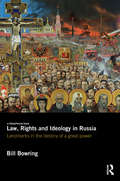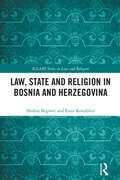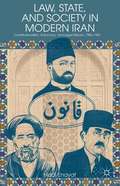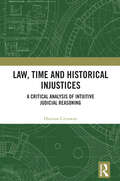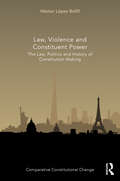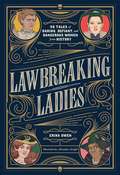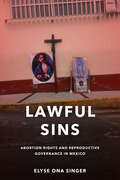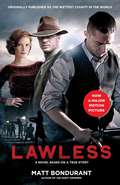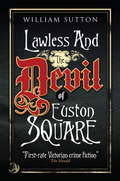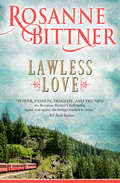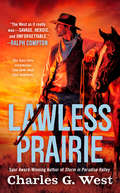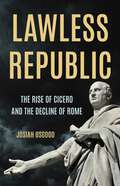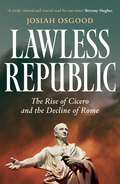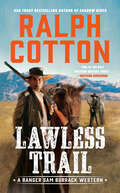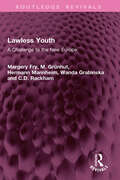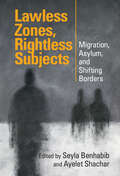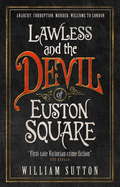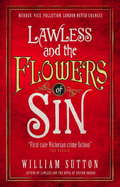- Table View
- List View
Law, Order, and Empire: Policing and Crime in Colonial Algeria, 1870–1954
by Samuel KalmanWhile much attention has focused on society, culture, and the military during the Algerian War of Independence, Law, Order, and Empire addresses a vital component of the empire that has been overlooked: policing. Samuel Kalman examines a critical component of the construction and maintenance of a racial state by settlers in Algeria from 1870 onward, in which Arabs and Berbers were subjected to an ongoing campaign of symbolic, structural, and physical violence. The French administration encouraged this construct by expropriating resources and territory, exploiting cheap labor, and monopolizing government, all through the use of force. Kalman provides a comprehensive overview of policing and crime in French Algeria, including the organizational challenges encountered by officers. Unlike the metropolitan variant, imperial policing was never a simple matter of law enforcement but instead engaged in the defense of racial hegemony and empire. Officers and gendarmes waged a constant struggle against escalating banditry, the assault and murder of settlers, and nationalist politics—anticolonial violence that rejected French rule. Thus, policing became synonymous with repression, and its brutal tactics foreshadowed the torture and murder used during the War of Independence. To understand the mechanics of empire, Kalman argues that it was the first line of defense for imperial hegemony. Law, Order, and Empire outlines not only how failings in policing were responsible for decolonization in Algeria but also how torture, massacres, and quotidian colonial violence—introduced from the very beginning of French policing in Algeria—created state-directed aggression from 1870 onward.
Law, Politics and Society in Early Modern England
by Christopher W. BrooksLaw, like religion, provided one of the principal discourses through which early-modern English people conceptualised the world in which they lived. Transcending traditional boundaries between social, legal and political history, this innovative and authoritative study examines the development of legal thought and practice from the later middle ages through to the outbreak of the English civil war, and explores the ways in which law mediated and constituted social and economic relationships within the household, the community, and the state at all levels. By arguing that English common law was essentially the creation of the wider community, it challenges many current assumptions and opens new perspectives about how early-modern society should be understood. Its magisterial scope and lucid exposition will make it essential reading for those interested in subjects ranging from high politics and constitutional theory to the history of the family, as well as the history of law.
Law, Politics and the Gender Binary
by Petr AghaThe distinction between male and female, or masculinity and femininity, has long been considered to be foundational to society and the organization of its institutions. In the last decades, the massive literature on gender has challenged this discursive construction. Gender has been disassembled and reassembled, variously considered as social practice, performance, ideology. Yet the binary relationship ‘man/woman’ continues to be a characteristic trait of Western societies. This book gathers together contributions by experts in various fields – including law, sociology, philosophy and anthropology – to pin down the relationship between institutions and the gender binary. Centrally, it examines the way in which the present-day gender binary is shored up by the conceptualization and regulation of sex and gender at societal and institutional levels. Based on this examination, it tackles the issue of what the practices and processes of subjectivation are that preserve this binary distinction as the foundation of gender. Each of the chapters discusses this pressing question with a view to considering whether current equality policies challenge hierarchical and hegemonic understandings of gender or are the residue of a sexist understanding of gender. This analysis then paves the way for a more general and crucial question: whether institutions can, or should, contribute to the process of deconstructing the gender binary.
Law, Politics, and Morality in Judaism (Ethikon Series in Comparative Ethics)
by Michael WalzerJewish legal and political thought developed in conditions of exile, where Jews had neither a state of their own nor citizenship in any other. What use, then, can this body of thought be today to Jews living in Israel or as emancipated citizens in secular democratic states? Can a culture of exile be adapted to help Jews find ways of being at home politically today? These questions are central in Law, Politics, and Morality in Judaism, a collection of essays by contemporary political theorists, philosophers, and lawyers. How does Jewish law accommodate--or fail to accommodate--the practice of democratic citizenship? What range of religious toleration and pluralism is compatible with traditional Judaism? What forms of coexistence between Jews and non-Jews are required by shared citizenship? How should Jews operating within halakha (Jewish law) and Jewish history judge the use of force by modern states? The authors assembled here by prominent political theorist Michael Walzer come from different points on the religious-secular spectrum, and they differ greatly in their answers to such questions. But they all enact the relationship at issue since their answers, while based on critical Jewish texts, also reflect their commitments as democratic citizens. The contributors are Michael Walzer, David Biale, the late Robert M. Cover, Menachem Fisch, Geoffrey B. Levey, David Novak, Aviezer Ravitzky, Adam B. Seligman, Suzanne Last Stone, and Noam J. Zohar.
Law, Politics, and Perception: How Policy Preferences Influence Legal Reasoning (Constitutionalism and Democracy)
by Eileen BramanAre judges' decisions more likely to be based on personal inclinations or legal authority? The answer, Eileen Braman argues, is both. Law, Politics, and Perception brings cognitive psychology to bear on the question of the relative importance of norms of legal reasoning versus decision markers' policy preferences in legal decision-making. While Braman acknowledges that decision makers' attitudes--or, more precisely, their preference for policy outcomes--can play a significant role in judicial decisions, she also believes that decision-makers' belief that they must abide by accepted rules of legal analysis significantly limits the role of preferences in their judgements. To reconcile these competing factors, Braman posits that judges engage in "motivated reasoning," a biased process in which decision-makers are unconsciously predisposed to find legal authority that is consistent with their own preferences more convincing than those that go against them. But Braman also provides evidence that the scope of motivated reasoning is limited. Objective case facts and accepted norms of legal reasoning can often inhibit decision makers' ability to reach conclusions consistent with their preferences.
Law, Politics, and Responding to Injustice
by Wojciech Sadurski Kevin Walton Coel KirkbyThis book examines the issue of injustice, and our responses to it, in a range of contemporary contexts.In her ground-breaking book The Faces of Injustice (1990), Judith Shklar draws attention to our tendency to view injustice as an abnormality. Of course it is not: injustice is ubiquitous. But how should we respond to it? The book brings together leading legal and political theorists to explore the nature of injustice, its relationship to law, and responses to it, in a variety of contexts. Their chapters cover issues such as protest, resistance, violence, the moral obligation to obey the law, civil disobedience, democratic reform, and transitional justice. They all, though, share a concern to examine such issues through a Shklar-inspired focus on injustice.This book will appeal to academics and advanced students in law, politics, and philosophy.
Law, Resources and Time-Space Constructing: Internal Evolutionary Logic for Chinese Judiciary During the 19th Century
by Zhang ShimingThis book studies the judicial evolution of the Qing Dynasty. It sums up the changes from six major aspects: 1. Banfang(班房)emerged in the late Qianlong period; 2. The opening of capital appeals(京控)early in Jiaqing’s reign; 3. The consular jurisdiction was established during Daoguang’s reign; 4. The execution on the spot (就地正法)was started in Daoguang and Xianfeng periods; 5. The introduction of fashenju (发审局,a interrogatory court) happened during Tongzhi’s reign; 6. Late in Guangxu’s reign, banishment was abolished, and reforms were made for prisons. In the past, people did not have a comprehensive understanding of these big changes. From the perspective of legal culture, scholars often criticize traditional Chinese law focuses on criminal law while ignores civil law in terms of legal culture, but this situation can be explained in part by the inadequate allocation of resources and authoritarian resources in traditional societies. Using a large number of archives and precious materials such as private notes that were not noticed by academics in the past, this book adopts the research path of new historical jurisprudence to explore the inner logic of judicial evolution in the Qing Dynasty, focusing on the triangular connection between legal rules, resources, and temporal and spatial constructions, which is an important contribution to the study of traditional Chinese law.
Law, Rights and Ideology in Russia: Landmarks in the Destiny of a Great Power
by Bill BowringLaw, Rights and Ideology in Russia: Landmarks in the destiny of a great power brings into sharp focus several key episodes in Russia’s vividly ideological engagement with law and rights. Drawing on 30 years of experience of consultancy and teaching in many regions of Russia and on library research in Russian-language texts, Bill Bowring provides unique insights into people, events and ideas. The book starts with the surprising role of the Scottish Enlightenment in the origins of law as an academic discipline in Russia in the eighteenth century. The Great Reforms of Tsar Aleksandr II, abolishing serfdom in 1861 and introducing jury trial in 1864, are then examined and debated as genuine reforms or the response to a revolutionary situation. A new interpretation of the life and work of the Soviet legal theorist Yevgeniy Pashukanis leads to an analysis of the conflicted attitude of the USSR to international law and human rights, especially the right of peoples to self-determination. The complex history of autonomy in Tsarist and Soviet Russia is considered, alongside the collapse of the USSR in 1991. An examination of Russia’s plunge into the European human rights system under Yeltsin is followed by the history of the death penalty in Russia. Finally, the secrets of the ideology of ‘sovereignty’ in the Putin era and their impact on law and rights are revealed. Throughout, the constant theme is the centuries long hegemonic struggle between Westernisers and Slavophiles, against the backdrop of the Messianism that proclaimed Russia to be the Third Rome, was revived in the mission of Soviet Russia to change the world and which has echoes in contemporary Eurasianism and the ideology of sovereignty.
Law, State and Religion in Bosnia and Herzegovina (ICLARS Series on Law and Religion)
by Nedim Begović Emir KovačevićThis book explores relations between state, religion and law in Bosnia and Herzegovina. Historically, multi-religiousness has been a constant feature of the Bosnian polity, from its creation in 12th century until modern times. Since the middle of the 19th Century, Catholics have tended to self-identify as Croats, Orthodox Christians as Serbs, and Muslims as Bosniaks. Moreover, in a region that has undergone significant recent transformation, from the communist to the liberal political system, Bosnia and Herzegovina represents a very interesting case for the study of the relationship between state and religion. This book includes a short overview of historical aspects of these relations and a detailed analysis of the existing constitutional and legal framework on freedom of religion and relations between the state and religious communities. It assesses the actual implementation in practice, including the relevant national courts’ case-law. The work covers both the developments of new legal standards, while also identifying the main obstacles in their implementation. At a time when the region is again the subject of much interest, this book will be essential reading for those working in the areas of Law and Religion, Constitutional Law and Transitional Justice.
Law, State, and Society in Modern Iran
by Hadi EnayatUsing a 'Historical Institutionalist' approach, this book sheds light on a relatively understudied dimension of state-building in early twentieth century Iran, namely the quest for judicial reform and the rule of law from the 1906 Constitutional Revolution to the end of Reza Shah's rule in 1941.
Law, Time and Historical Injustices: A Critical Analysis of Intuitive Judicial Reasoning
by Harison CitrawanThis book provides a critical assessment of how judges reason in the adjudication of historical injustices.The practice of adjudication in historical cases of injustice require that, in determining collective responsibility, judges impart meaning to past injuries. This book analyses the narrative mechanisms through which this meaning is produced. Focusing on three areas of adjudication–racial discrimination, post-colonial extractivism and the climate crisis–the book’s analysis focuses on the issue of time. It considers the interplay of how historical injustice adjudication is shaped by temporal presuppositions and how it enacts a particular idea of temporality. As experiences of injustice are narrated, the book demonstrates how some of those experiences are included and others are excluded within the process of adjudication. Drawing on legal theory, legal epistemology and the philosophy of time, the book thus offers an instructive, and provocative, account of how collective responsibility is determined in cases of historical injustice.This book will appeal to scholars working in the fields of legal theory, legal reasoning, socio-legal studies, comparative jurisprudence and transitional justice.
Law, Violence and Constituent Power: The Law, Politics And History Of Constitution Making (Comparative Constitutional Change)
by Héctor López BofillThis book challenges traditional theories of constitution-making to advance an alternative view of constitutions as being founded on power which rests on violence. The work argues that rather than the idea of a constitution being the result of political participation and deliberation, all power instead is based on violence. Hence the creation of a constitution is actually an act of coercion, where, through violence, one social group is able to impose itself over others. The book advocates that the presence of violence be used as an assessment of whether genuine constitutional transformation has taken place, and that the legitimacy of a constitutional order should be dependent upon the absence of killing. The book will be essential reading for academics and researchers working in the areas of constitutional law and politics, legal and political theory, and constitutional history.
Lawbreaking Ladies: 50 Tales of Daring, Defiant, and Dangerous Women from History
by Erika OwenDiscover 50 fascinating tales of female pirates, fraudsters, gamblers, bootleggers, serial killers, madams, and outlaws in this illustrated book of lawbreaking and legendary women throughout the ages.Many of us are familiar with the popular slogan &“Well-behaved women seldom make history.&” But that adage is taken to the next level in this book, which looks at women from the past who weren&’t afraid to break the law or challenge gender norms. From pirates to madams, gamblers to bootleggers, and serial killers to outlaws, women throughout the ages haven&’t always decided to be sugar, spice, and everything nice. In Lawbreaking Ladies, author Erika Owen tells the stories of 50 remarkable women whose rebellious and often criminal acts ought to solidify their place in history, including: - The swashbuckling pirate Ching Shih - &“Queen of the Bootleggers&” Gloria de Casares - The Prohibition-era gangster Stephanie Saint-Clair - And a band of prisoners who came to be known as the Goree Girls The perfect gift for true crime fans and lovers of little-known women&’s history, Lawbreaking Ladies serves as an engaging and informative guide to gals who were daring, defiant, and sometimes downright dangerous.
Lawful Sins: Abortion Rights and Reproductive Governance in Mexico
by Elyse Ona SingerMexico is at the center of the global battle over abortion. In 2007, a watershed reform legalized the procedure in the national capital, making it one of just three places across Latin America where it was permitted at the time. Abortion care is now available on demand and free of cost through a pioneering program of the Mexico City Ministry of Health, which has served hundreds of thousands of women. At the same time, abortion laws have grown harsher in several states outside the capital as part of a coordinated national backlash. In this book, Elyse Ona Singer argues that while pregnant women in Mexico today have options that were unavailable just over a decade ago, they are also subject to the expanded reach of the Mexican state and the Catholic Church over their bodies and reproductive lives. By analyzing the moral politics of clinical encounters in Mexico City's public abortion program, Lawful Sins offers a critical account of the relationship among reproductive rights, gendered citizenship, and public healthcare. With timely insights on global struggles for reproductive justice, Singer reorients prevailing perspectives that approach abortion rights as a hallmark of women's citizenship in liberal societies.
Lawless
by Matt BondurantWith a Foreword by Director John Hillcoat Based on the true story of Matt Bondurant's grandfather and two granduncles, Lawless is a gripping tale of brotherhood, greed, and murder. The Bondurant Boys were a notorious gang of roughnecks and moonshiners who ran liquor through Franklin County, Virginia, during Prohibition and in the years after. When Sherwood Anderson, the journalist and author of Winesburg, Ohio, was covering a story there, he christened it the "wettest county in the world." Anderson finds himself driving along dusty red roads, piecing together the clues linking the brothers to "The Great Franklin County Moonshine Conspiracy," and breaking open the silence that shrouds Franklin County. In vivid, muscular prose, Matt Bondurant brings these men--their dark deeds, their long silences, their deep desires--to life. His understanding of the passion, violence, and desperation at the center of this world is both heartbreaking and magnificent.. His understanding of the passion, violence, and desperation at the center of this world is both heartbreaking and magnificent.
Lawless & The Devil of Euston Square
by William SuttonMurder. Vice. Pollution. Delays on the Tube. Some things never change...London 1859-62. A time of great exhibitions, foreign conquests and underground trains. But the era of Victorian marvels is also the time of the Great Stink. With cholera and depravity never far from the headlines, it's not only the sewers that smell bad.Novice detective, Campbell Lawless, stumbles onto the trail of Berwick Skelton, an elusive revolutionary, seemingly determined to bring London to its knees through a series of devilish acts of terrorism.But cast into a lethal, intoxicating world of music hall hoofers, industrial sabotage and royal scandal, will Lawless survive long enough to capture this underworld nemesis, before he unleashes his final vengeance on a society he wants wiped from the face of the Earth?Lawless & The Devil of Euston Square is the first of a series of historical thrillers by William Sutton set during the mid-nineteenth century, featuring Metropolitan policeman, Campbell Lawless, aka the Watchman, on his rise through the ranks and his initiation as a spy.Before Holmes, there was Lawless...Before Campbell Lawless, the London streets weren't safe to walk...
Lawless Love
by Rosanne BittnerA man ruled by his gun meets a woman led by her heart in a dazzling western historical romance from the bestselling author of Shameless. When Moss Tucker smells danger, he shoots it. When he needs shelter, he grabs it. And when he wants a woman&’s touch, he buys it. But then he sees Amanda Boone&’s sparkling azure eyes—an innocent beauty like her would never get involved with a law-breaking man like him. Chestnut-haired Amanda tries to keep her gaze on the vast frontier that flashes past her train window—but it keeps straying to the buckskin-clad stranger. Every inch of him is virile and strong. She knows it&’s wrong to even think of his muscular arms crushing her soft curves in a fierce embrace. Yet she vows that before the trip is over he will be the one to tame her savage desire with his wild and lawless love. &“Bittner&’s characters spring to life . . . Extraordinary for the depth of emotion with which they are portrayed.&” —Publishers Weekly
Lawless Prairie
by Charles G. WestClint Connor stole a horse to protect it from its brutal owner-and went to jail for his trouble. Caught up in a daring jailbreak, Connor is now on the run from both the law-and the lawless.
Lawless Republic: The Rise of Cicero and the Decline of Rome
by Josiah OsgoodA historian of Rome &“at the height of his powers&” (Barry Strauss, author of The War That Made the Roman Empire) narrates the erosion of law and order in the last years of the Roman Republic through the rise and fall of its most famous lawyer, Cicero In its final decades, the Roman Republic was engulfed by a crime wave. An epidemic of extortions, murders, and acts of insurrection tested the court system&’s capacity to maintain order. As case after case filled the docket, an ambitious young lawyer named Cicero seized every opportunity to litigate, forging a reputation as a master debater with a bright future in politics. In Lawless Republic, historian Josiah Osgood recounts the legendary orator&’s ascent and fall, and his pivotal role in the republic&’s lurch toward autocracy. Cicero&’s first appearance in the courts came shortly after the end of a brutal civil war. After leveraging his fame as a lawyer to become a consul, he ruthlessly crushed a coup by suppressing the liberties of Roman citizens. The premiere legal mind of Rome came to argue that the pursuit of a higher justice could sometimes justify sweeping the law aside, laying the groundwork for Roman history&’s most famous act of political violence—the assassination of Julius Caesar. Lawless Republic vividly resurrects the spectacle of the courts in the time of Cicero and Caesar, showing how politics trumped the rule of law and sealed the fate of Rome.
Lawless Republic: The Rise of Cicero and the Decline of Rome
by Josiah Osgood'A vivid, visceral and crucial read for our times' BETTANY HUGHES'Wonderful and insightful' ADRIAN GOLDSWORTHYThe collapse of law and order in the last years of the Roman Republic told through the rise and fall of its most famous lawyer, Cicero.In its final decades, the Roman Republic was engulfed by crime. Cases of extortion, murder and insurrection gave an ambitious young lawyer named Cicero high-profile opportunities to litigate and forge a reputation as a master debater with a bright political future. In Lawless Republic, leading Roman historian Josiah Osgood recounts the legendary orator's ascent and fall, and his pivotal role in the republic's lurch toward autocracy. Cicero's first appearance in the courts came shortly after the end of a brutal civil war. After leveraging his fame as a lawyer to become a consul, he ruthlessly crushed a coup by suppressing the liberties of Roman citizens. The premiere legal mind of Rome came to argue that the pursuit of a higher justice could sometimes justify sweeping the law aside, laying the groundwork for Roman history's most famous act of political violence - the assassination of Julius Caesar. Lawless Republic vividly resurrects the spectacle of the courts in the time of Cicero and Caesar, showing how politics trumped the rule of law and sealed the fate of Rome.
Lawless Trail
by Ralph CottonA Family Affair The Traybo brothers have a reputation for being gentleman outlaws-the kind who will make polite chatter as they take your life savings. But Ranger Samuel Burrack has no sympathy for those who show poor manners when it comes to obeying the law. He’s traveled as far as the Mexican Badlands to pick up the Traybo brothers’ ex-cohort Fatch Hardaway to lead him to his prey. Burrack isn’t alone on his pursuit. Ranger Dallas Garand and his gang let the Traybo brothers slip through their fingers during a robbery once before, and they don’t plan on letting history repeat. Instead of joining forces with Burrack to create a unified front, though, Garand is going his own way. It’s Garand against Burrack on the trail of these criminal brothers-and may the best ranger win. . . . More Than 2. 5 Million Ralph Cotton Books in Print .
Lawless Youth: A Challenge to the New Europe (Routledge Revivals)
by Hermann Mannheim Margery Fry M. Grünhut Wanda Grabinska C.D. RackhamLawless Youth (1947) is a book prepared under the auspices of the International Committee of the Howard League for Penal Reform during the Second World War, aiming for the day when peace could offer the opportunity for advance on the lines of justice and humanity. The authors visualised the grim reality of winning back for society the children and young men and women whom war had made rebels and outlaws, inured to violence. The chapters published here are the results of great thought, and offer the ideal for dealing with the youth of the day.
Lawless Zones, Rightless Subjects: Migration, Asylum, and Shifting Borders
by Seyla Benhabib Ayelet ShacharResponding to ever-increasing pressures of migration, states, supranational, and subnational actors deploy complex moves and maneuvers to reconfigure borders, rights, and territory, giving rise to a changing legal cartography of international relations and international law. The purpose of this volume is to study this new reconfiguration of rights, territoriality, and jurisdiction at the empirical and normative levels and to examine its implications for the future of democratic governance within and across borders. Written by a diverse and accomplished group of scholars, the chapters in this volume employ legal, historical, philosophical, critical, discursive, and postcolonial perspectives to explore how the territoriality of the modern states – ostensibly, the most stable and unquestionable element undergirding the current international system – has been rewritten and dramatically reimagined. This title is also available as Open Access on Cambridge Core.
Lawless and the Devil of Euston Square
by William SuttonLondon, 1859. Great exhibitions. Foreign conquests. Underground trains. The era of Victorian marvels is also the time of the Great Stink. Beneath the respectable surface, a multitude of ills need flushing out. When a man is killed in a hydraulic burst, novice detective Campbell Lawless stumbles on to the trail of Berwick Skelton: this elusive activist rose from humble beginnings to cross swords with London's illuminati, before vanishing, heartbroken, amid presages of disaster. The Worms, a gang of urchins, help Lawless investigate the 'Skeleton Thefts' mystifying society, revealing to him the disillusion that lurks beneath the filthy cobblestones. Berwick's trail leads to music hall hoofers, industrial sabotage and royal scandal. Lawless peels away veneers of secrecy to convince the powers-that-be of Berwick's revolutionary plans. Can he track down the underworld mastermind before he wreaks vengeance on those who ride roughshod over his people?
Lawless and the Flowers of Sin: Lawless 2
by William SuttonIt is 1863, and as a reluctant Inspector of Vice, Campbell Lawless undertakes a reckoning of London's houses of ill repute, a shadowy netherworld of frayed glamour and double standards, mesmerising and unspeakable by turns. From the erotic booksellers of Holywell Street to the alleys of Haymarket, he discovers backstreet cast-offs and casualties of the society bordellos, and becomes fascinated by a musician who has established a foundation for fallen women. But his inquiries draw the attention of powerful men, who can be merciless in defending their reputations. Lawless must unlock the heart of a clandestine network, before he too is silenced...
